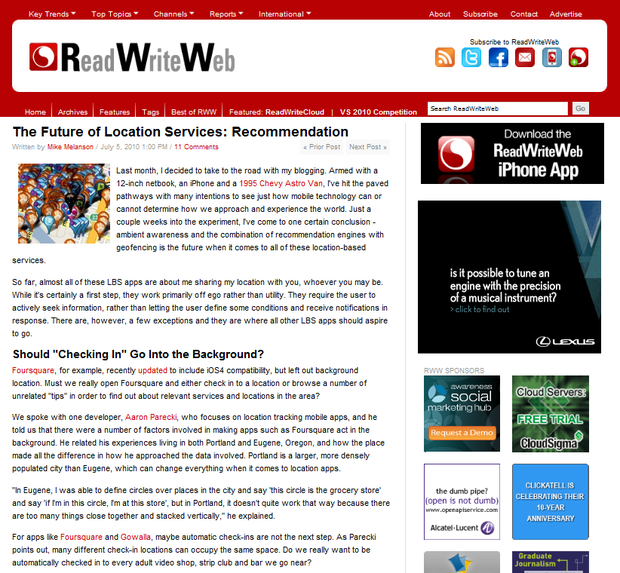Monday, July 5, 2010
-
Eugene, Oregon • Mon, July 5, 2010 12:29pm
-
at Café Yumm!Eugene, Oregon • Mon, July 5, 2010 4:01pm
-
at The BeaneryEugene, Oregon • Mon, July 5, 2010 4:01pm
-
The Future of Location Services: Recommendation (www.readwriteweb.com)
Last month, I decided to take to the road with my blogging. Armed with a 12-inch netbook, an iPhone and a 1995 Chevy Astro Van, I've hit the paved pathways with many intentions to see just how mobile technology can or cannot determine how we approach and experience the world. Just a couple weeks into the experiment, I've come to one certain conclusion - ambient awareness and the combination of recommendation engines with geofencing is the future when it comes to all of these location-based services.
2010-07-05 readwriteweb background location.png So far, almost all of these LBS apps are about me sharing my location with you, whoever you may be. While it's certainly a first step, they work primarily off ego rather than utility. They require the user to actively seek information, rather than letting the user define some conditions and receive notifications in response. There are, however, a few exceptions and they are where all other LBS apps should aspire to go.
Should "Checking In" Go Into the Background?
Foursquare, for example, recently updated to include iOS4 compatibility, but left out background location. Must we really open Foursquare and either check in to a location or browse a number of unrelated "tips" in order to find out about relevant services and locations in the area?
We spoke with one developer, Aaron Parecki, who focuses on location tracking mobile apps, and he told us that there were a number of factors involved in making apps such as Foursquare act in the background. He related his experiences living in both Portland and Eugene, Oregon, and how the place made all the difference in how he approached the data involved. Portland is a larger, more densely populated city than Eugene, which can change everything when it comes to location apps.
"In Eugene, I was able to define circles over places in the city and say 'this circle is the grocery store' and say 'if I'm in this circle, I'm at this store', but in Portland, it doesn't quite work that way because there are too many things close together and stacked vertically," he explained.
For apps like Foursquare and Gowalla, maybe automatic check-ins are not the next step. As Parecki points out, many different check-in locations can occupy the same space. Do we really want to be automatically checked in to every adult video shop, strip club and bar we go near?
On the other hand, these same services could use their wealth of geolocation data and check-in history to make location-based recommendations
Location-Based Recommendation Engines
What if I want to be able to tell an app that, today, I'd really like to go swimming while I'm out and about and have it alert me to swimming holes as I'm out running my errands. Or how about an app that lets me know, as I explore a new city, of art museums as they near within two miles? Maybe an app that alerts me to registered historical landmarks? Parecki said that this type of scenario is entirely possible, but access to location data and battery life are the primary areas holding back location apps from persistent background operation.
One app that recently updated and really gets it is Trapster, the iPhone app that keeps track of road hazards, speed traps and even roadkill. Although we ran into some general GPS issues, the latest version of the app does exactly what we'd expect - it runs in the background and responds to a series of user-defined settings. As you drive along, it will notify you of upcoming road hazards or other whatever else you set it to notify you about. One of the great things about an app like Trapster is that you know you're going to be in a vehicle, so the issue of battery life is likely eliminated, as you can keep the phone plugged in the whole time.
Another great app I've run into in my travels is & RV by AllStays. Although the app does not have background location or PuSH notifications, it has extensive settings for what types of points-of-interest you'd like to know about and how close they need to be before being included in the listing. As you drive along, you can have your co-pilot look at the app and it will tell you what points-of-interest, from Walmarts with overnight parking to state campgrounds to truck stops, are off the nearest highway exits. The app would take little more than a simple addition of background location and push notifications to be fully there.
As far as location data, AllStays has been gathering this sort of data since 1999, providing a database of travel locations as its primary business, and Trapster relies on crowdsourcing its data.
The pairing of background location with real-time data and user preference is the next step for LBS services. While we're all busy worrying that the Internet is going to whittle our existence down into a series of 0s and 1s, it already has but we're missing out on the benefits. Apps that are careful to respect our privacy with appropriate settings could open the world of mobile technology up to the very real potential that's out there.

-
Eugene, Oregon • Mon, July 5, 2010 7:49pm



